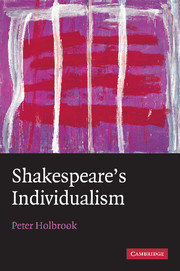Book contents
- Frontmatter
- Contents
- Acknowledgements
- Introduction
- PART I SHAKESPEARE, HAMLET, SELFHOOD
- PART II SHAKESPEARE AND EVIL
- 9 ‘Old lad, I am thine own’: authenticity and Titus Andronicus
- 10 Evil and self-creation
- 11 Libertarian Shakespeare: Mill, Bradley
- 12 Shakespearean immoral individualism: Gide
- 13 Strange Shakespeare: Symons and others
- 14 Eliot's rejection of Shakespeare
- 15 Shakespearean immoralism: Antony and Cleopatra
- 16 Making oneself known: Montaigne and the Sonnets
- PART III SHAKESPEARE AND SELF-GOVERNMENT
- Conclusion: Shakespeare's ‘beauteous freedom’
- Index
- References
12 - Shakespearean immoral individualism: Gide
Published online by Cambridge University Press: 06 July 2010
- Frontmatter
- Contents
- Acknowledgements
- Introduction
- PART I SHAKESPEARE, HAMLET, SELFHOOD
- PART II SHAKESPEARE AND EVIL
- 9 ‘Old lad, I am thine own’: authenticity and Titus Andronicus
- 10 Evil and self-creation
- 11 Libertarian Shakespeare: Mill, Bradley
- 12 Shakespearean immoral individualism: Gide
- 13 Strange Shakespeare: Symons and others
- 14 Eliot's rejection of Shakespeare
- 15 Shakespearean immoralism: Antony and Cleopatra
- 16 Making oneself known: Montaigne and the Sonnets
- PART III SHAKESPEARE AND SELF-GOVERNMENT
- Conclusion: Shakespeare's ‘beauteous freedom’
- Index
- References
Summary
What kept me from believing in the devil was that I wasn't quite sure of hating him.
–Gide, Journals (25 September 1914), 223.Enthusiasm for Shakespeare today often implies bourgeois respectability. But as we have seen in the case of Bradley, Bardolatry has played its part in projects of self-creation that conflict with moral norms. This seems especially true of the nineteenth and early twentieth centuries, when Bradley was writing. Celebrating Shakespeare then could be a means of subtly justifying dissident or non-conformist identities. It is not insignificant that antinomian individualists in this period, like Walter Pater, Wilde, Swinburne, John Addington Symonds and Arthur Symons, should all have written about Shakespeare. Such writers use him to legitimate their own non-conformist desires.
One of the most audacious writers of this period was André Gide, whose autobiography, If It Die (1920), contains an extraordinarily explicit account of his homosexuality and sexual tourism in North Africa. Gide was a friend of Wilde's and, as Alan Sheridan notes, was fêted by the young as giving ‘expression and authority to a freedom of action and thought that they aspired to’. Like Bradley and Gosse, Gide grew up in a strict Protestant milieu. But he became an atheist and was influenced by Nietzsche: stylistically, Fruits of the Earth (written in 1897) has something in common with the dithyrambic Thus Spoke Zarathustra. In the 1930s Gide flirted with Communism.
- Type
- Chapter
- Information
- Shakespeare's Individualism , pp. 137 - 146Publisher: Cambridge University PressPrint publication year: 2010



